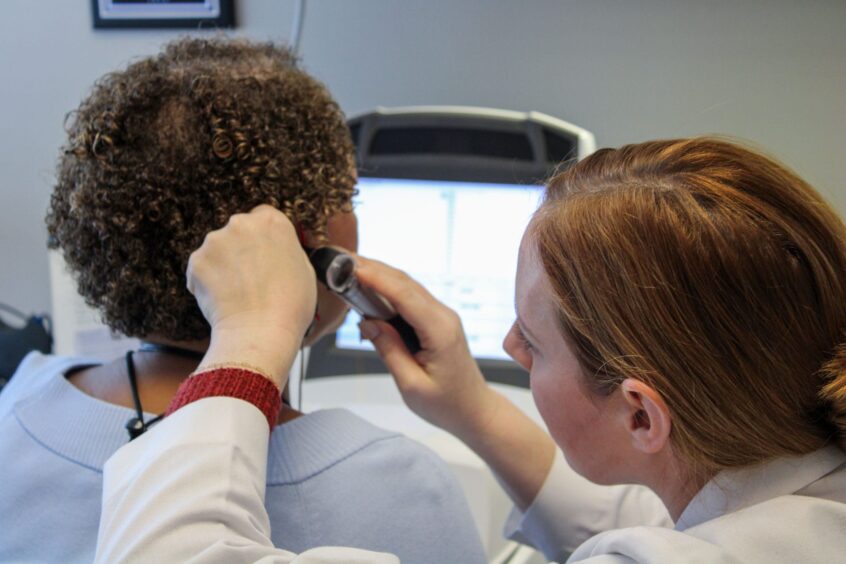As we ring in 2024, after attending holiday gatherings, one of the questions you may be asking yourself is, “Am I hearing as well as I could be?”
To answer that question, start with a comprehensive hearing evaluation performed by a doctoral-level audiologist. A hearing evaluation should include a thorough discussion of your symptoms, medical history, medication review and any other concerns you may have. Depending on your hearing loss symptoms and case history, an audiologist may perform several different tests, which may include the following:
- Otoscopic examination to evaluate the status of your outer ear, ear canal, and eardrum.
- Tympanometry/Immittance testing to reveal the status of your middle ear system.
- Air conduction and bone conduction threshold testing to determine the softest sounds you can hear at different frequencies. This testing also reveals the type, degree, and configuration of your hearing loss. It is more than a hearing screening.
- Word recognition testing to assess your ability to understand speech when the volume of the speech signal is adequate for your level of hearing.
- Otoacoustic emission testing to differentiate sensory (inner ear) from neural (nerve) hearing loss.
- Loudness discomfort testing (when warranted) to measure your ability to tolerate loud sounds and identify the presence of decreased sound tolerance.
This entire process could take as long as an hour to an hour and a half. So-called “hearing screenings” may only take a few minutes, and are just a snapshot of your hearing. They should not be used to determine whether you are a candidate for prescription hearing aids.
Following the testing, the audiologist will explain the results to you, usually in the form of an audiogram, and will answer any questions you may have. An audiogram is a graph which gives a detailed description of your hearing ability and which can be described as a picture of your sense of hearing.
If the results indicate your hearing is within normal ranges, the audiologist will likely recommend a follow-up schedule that’s appropriate to monitor your hearing, depending on the test findings, as well as your age and general health.
If the audiologist finds you have a hearing loss, they will offer more information about your hearing loss, and can make recommendations for prescription hearing aids based on your needs, lifestyle and budget.
Tips for Purchasing Prescription Hearing Aids
If it turns out prescription hearing aids are in your future for 2024, here are some tips to guide you in the buying process:
- Work with an audiologist who can give you options specific to you and your lifestyle. Your audiologist should be able to choose from a variety of prescription hearing aids from a number of respected manufacturers. Franchise or “chain” stores often do not provide this flexibility for consumers.
- There are significant differences across hearing aid technology. A hearing aid uses tiny computer chips to process sound. More sophisticated computer chips have better processing which help make it easier for you to hear and understand in all situations. Typically, the cost of prescription hearing aids is $1,500-$5,400 a pair, depending on the sophistication of technology purchased. Prescription hearing aids also can be sold as individual units. The length of time or amount of the professional hearing aid-related services also can affect purchase price.
- Over-the-counter hearing aids are only sold as pairs and range in cost from $800-$1,600 a pair. This cost typically does not include professional services or a warranty like prescription hearing aids do.
- Make sure your audiologist uses specialized diagnostic and verification equipment, including real-ear probe microphone and speech mapping measures. These sophisticated tests independently verify how the prescription hearing aid functions while in your ear, and ensure you aren’t getting over-amplified.
- Regular follow-ups are necessary so expect to pre-schedule your appointments if you wear prescription hearing aids. Routine maintenance and regular monitoring of hearing and hearing aids are critical to success.
- A prescription hearing aid purchase should include an assessment period during which the hearing aid fee is refundable less a minimum non-refundable amount, if the device isn’t satisfactory. Be sure to ask about the other options available if a particular device doesn’t work out during the assessment period.
- Be informed. Advertisements that offer big discounts or special “discount plans” are usually based upon inflated manufacturer’s suggested retail price (MSRP). “Free trials” are often non-custom devices fit without verification. Also, be wary of advertisements promising discounts for trying new hearing aids under “study or clinical trial.” These marketing techniques can be misleading because hearing aid manufacturers conduct these studies prior to new product release. Beware of what appear to be less expensive options or third-party discount programs for hearing aids. These may not include all the professional services necessary to meet your ongoing needs. In addition, they sometimes only offer off-brand, lower-end technology.
- The FDA issued its ruling establishing a new class of hearing aids in August 2022 called over-the-counter, or OTC hearing aids. OTC hearing aids are only for individuals with perceived mild-to-moderate hearing loss. They are not for children under age 18 or for those with more severe hearing loss. Before purchasing OTC or prescription hearing aids, professional organizations recommend that the consumer have a diagnostic hearing evaluation to understand the type and degree of hearing loss, and available options.
- Prescription hearing aids are fit by licensed professionals such as audiologists. They have the ability to customize the hearing aid fitting and help patients whose hearing loss is more severe. Whether purchasing OTC or prescription hearing aids, consumers should be cautious to not be taken advantage of and they should fully understand return requirements and non-refundable fees.
To find out how well you’re hearing, schedule an appointment with a doctoral-level audiologist.



